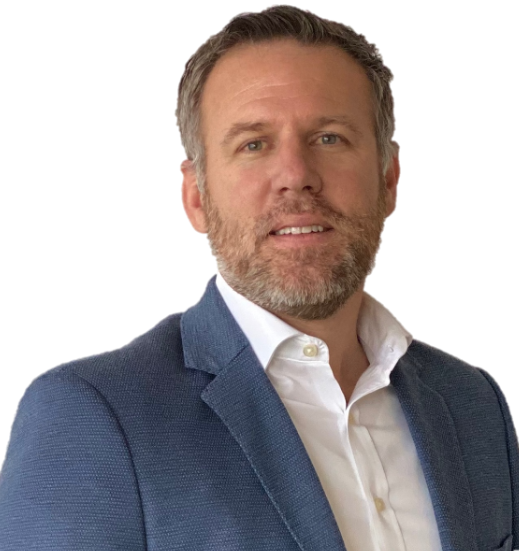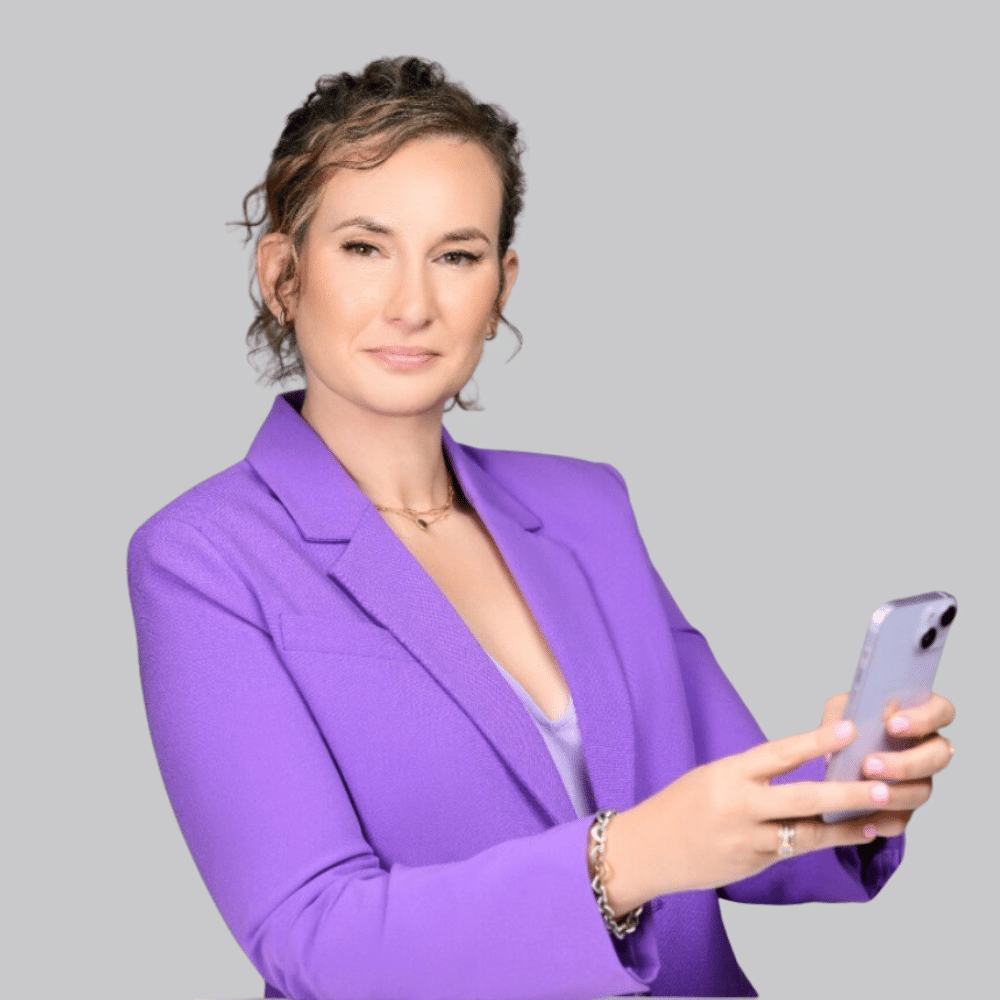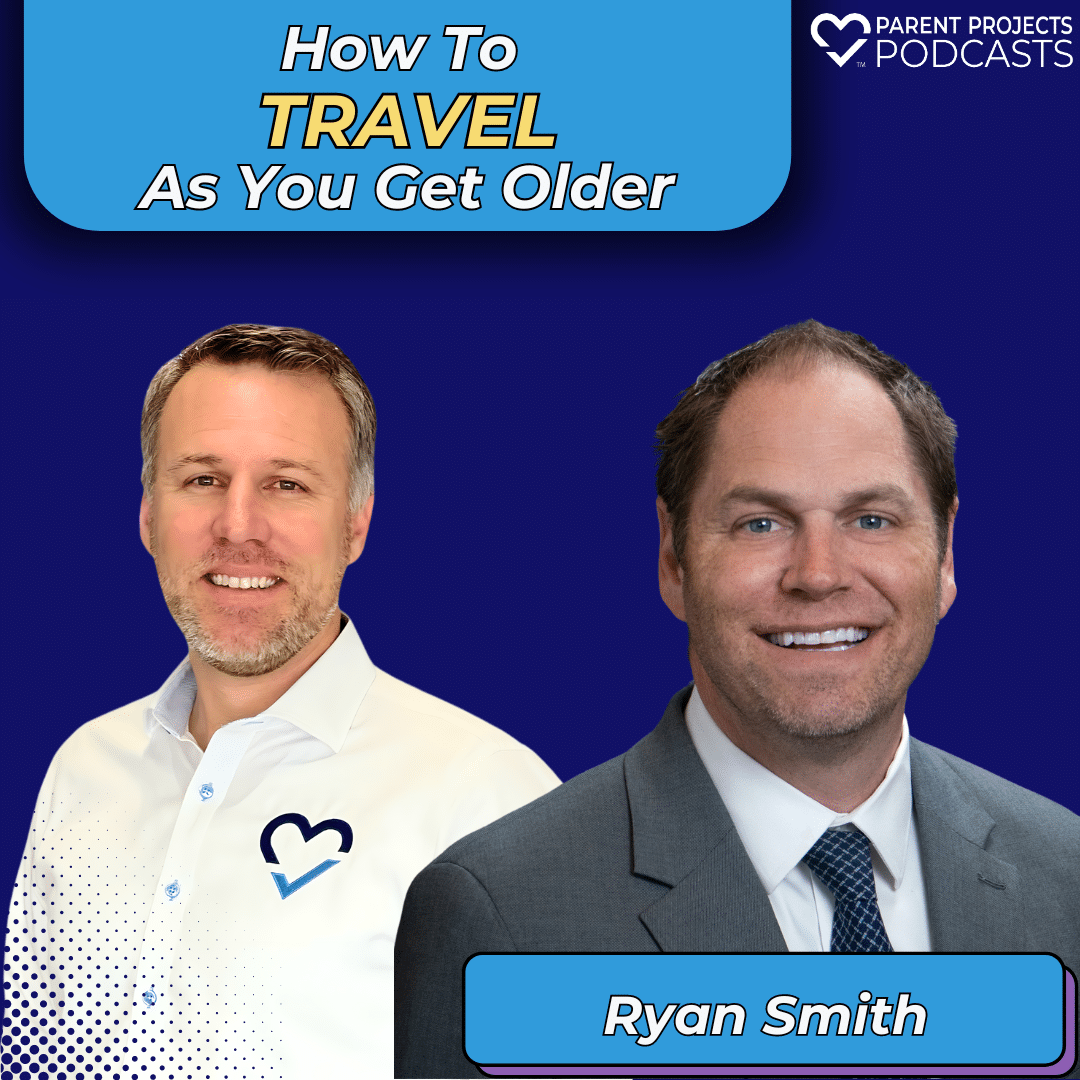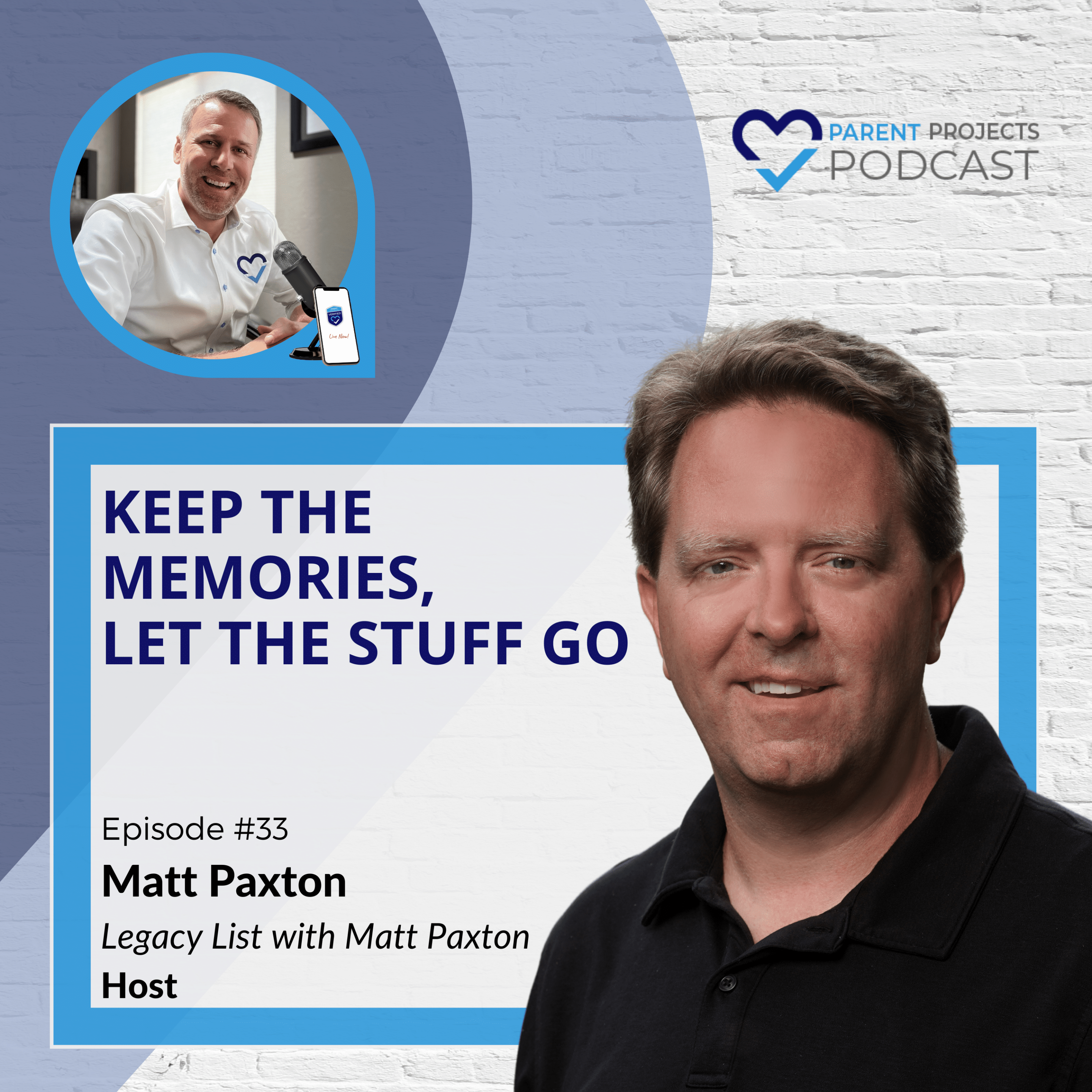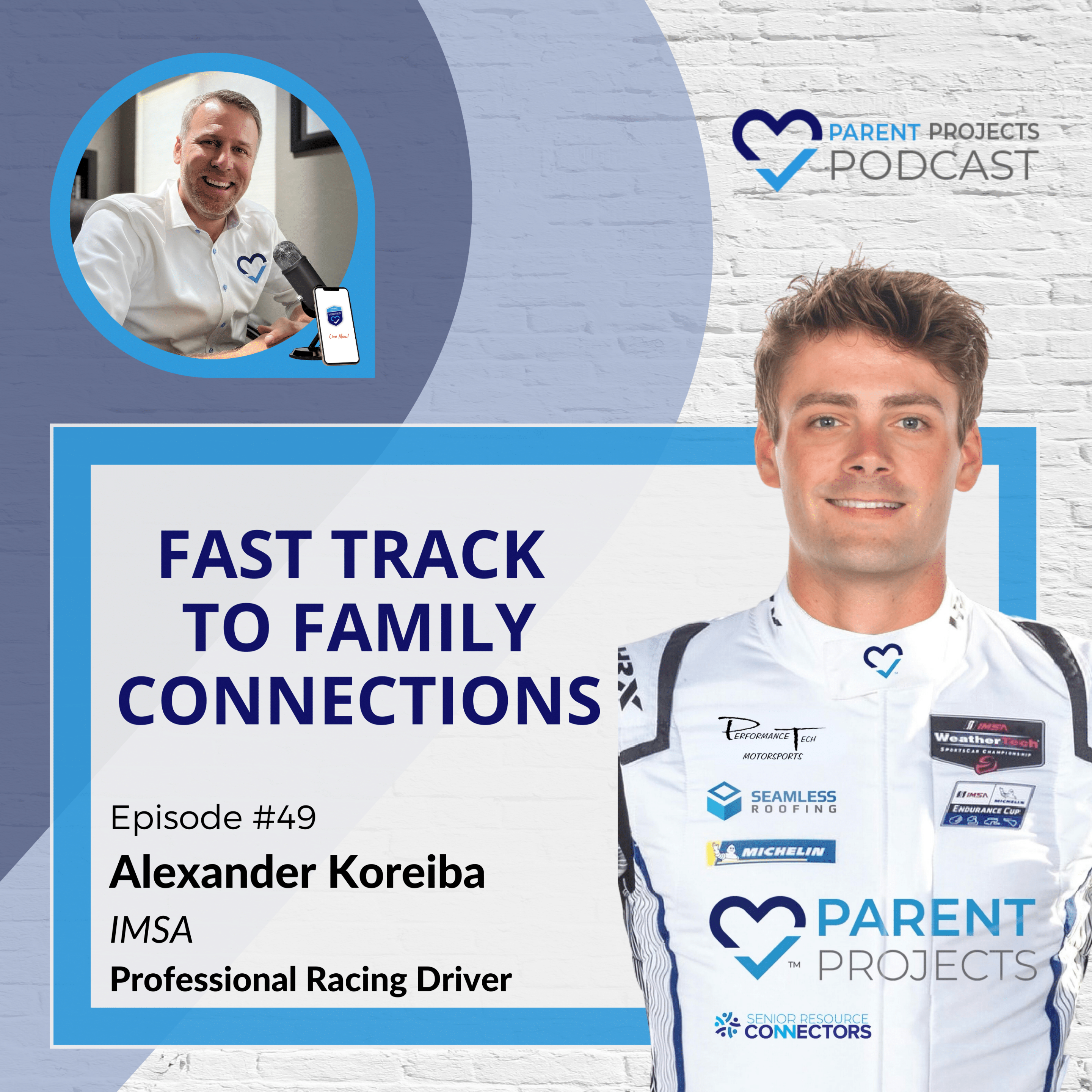Episode Transcript
[00:00:00] Speaker A: So there we were. We got the family together. You're pushing through the airport. You've got mom and dad maybe making just that last hurrah of a trip to come home for something. You're not sure if you're going to get another one of these. And nothing is going right from one thing to the next, whether something, maybe it's delayed in a city that's thousands of miles away from you, or maybe it's just you forgot something making it through and you need more time in the crowded area. There is an answer for that, and you're going to want to stay tuned today where we've got Ryan Smith with the Phoenix Mesa gateway authority out in Mesa, Arizona. That's going to talk us through how traveling safety with your, with your safely, with your aging loved one, some of the tips, the tricks, and they've got a super secret but Easter egg of an idea there. So stay tuned. You're not going to want to miss it on the Aging in America podcast with parent projects. Stay tuned. It starts right now.
You know, I'm blessed today to get an opportunity to bring to you a friend I've known for a long time who is really a great expert when it comes down to the airline industry and how you work through airports and work from that side of travel, which I got to tell you, there's a lot to it. It gets really complicated. And when it gets mixed into a parent project, it can get out of control. It can become overwhelming in a hurry. And so super excited to be able to see what they've got cooked up here in our backyard, but also in some of these programs that you're going to find across the country that have been rolling out over the last couple of years. So without further ado off of that, I want to bring in Ryan Smith, who is the director of communications and government relations with the Phoenix Mesa Gateway airport. Ryan, thanks for joining us today.
[00:01:45] Speaker B: Thanks for having me on. Thank you. I appreciate the opportunity.
[00:01:48] Speaker A: Well, it was genuinely, we talked a little before this. I know we were texting back and forth, you know, as I was waiting and picking up my own family that was flying and my parents flying in, and I saw that Lanyard, and we're going to talk about those lanyards, I think, here in just a bit, a special lanyard and some messaging out at the information desk. I had seen something that, you know, somebody had talked years ago. They said, boy, we should find a way to collaborate and help people move through this process easier in an airport. And I saw that you guys have done it. You guys have grasped onto this. It's an easy place to come in and out of, but you've used some really strong products for it. So, man, I'm thrilled for you to break it down and to explain what that is and some other trips. Thanks so much.
[00:02:32] Speaker B: Yeah, no, pleasure. It's a pleasure.
We have the benefit of being a smaller regional airport. Serve 45 destinations. About 2 million passengers come through each year, and a large number of those passengers are your older individuals, your grandma and grandpa going to visit grandkids, your families that are taking the whole family on a trip. And so we understand how air travel for anybody, whether you're a seasoned professional or if you're a first timer, how difficult it can be and how overwhelming sometimes it can be. And so everything we do is put forth the effort to make it a smooth and easy. Our tagline is just plain easy. So that's what we always are trying to do.
[00:03:21] Speaker A: Well, and you've got to do that. Like you alluded to, Mesa airport is a place that you have a ton of family travel, and you've got a lot of the snowbird travel in this particular market coming in and out constantly. So these aren't the people that are jumping on an airplane for work every Monday and Thursday. Right. And coming back and forth.
And they probably have pretty important destinations on the other side of whatever their plans are. Right. So talk about high pressure.
[00:03:50] Speaker B: Yeah, that's for sure. The number of graduations that we've heard about, the weddings, the, you know, the baptisms, whatever, you name it, someone has together. And frankly, I've got a family vacation.
I've been working months straight. This is my summer vacation. It's important for me to get because I've got it all planned out. I'm going to Disneyland. I'm going somewhere else.
And so what we always do, and when we train our people that are really the frontline people is remember every situation, this is the most important thing that they're doing for that day.
When you travel, it's not because it's not just on a whim. It's not like going to circle K. You're doing something big.
Sometimes those are great celebratory things. Sometimes they're not as great things. So what we always tell people and what we always train our frontline people is just always have it in mind that today is one of the most important days and it's a big day for them and it's a high stressful day.
[00:04:52] Speaker A: That is a, I think that's a really good thing to maybe put into the back of our head when we're helping a parent that's trying to get through that as well.
And also, especially as they start getting older, they may have fewer and fewer of those in front of them to be able to go through. And we just think it's kind of like an endless possibility, but that hopefully it doesn't ratchet up the pressure against all of that. But maybe it can help us with an understanding why they might really be on edge when they're traveling with us and have that importance.
[00:05:24] Speaker B: Yeah, a lot of times, you know, one of the things, and I think that goes back to the training programs that we try and instill and that we try and push is that, you know, when we have 2 million people come through our turnstiles, those TSA agents, those airline agents, they're seeing 2 million different people fly through. And if you're at a large airport, you know, that number could be 25 to 40 million. And so what I've always told people, and what we always tell people is that, yes, you see this thousands and thousands of times. You're going to tell somebody to put their bag on this, on this conveyor belt 10,000 times today. But understand, that's the first time they're hearing it. And sometimes it may have been five years since they traveled. They may be, and they may have never traveled before. So, so try and treat them with a little empathy and understand that this is the first time. I know it's frustrating. You said it 10,000 times today, and it might seem like a common thing of, well, you just take out your id or you just put your bag here on the conveyor belt. How difficult can that be?
We try and teach our people treat it as if it's the first time and then also treat it as if it's your mother, your grandmother that's flying through here.
And how would they react and how would they deal with a high stressful situation?
We always encourage passengers to get her early, and one of the reasons is because you just never know what roadblock may come up. It could be a long line. You could have a delayed flight. You could have another delayed flight. That has nothing to do with your flight, but that may cascade onto, to your travel plans. And so my first suggestion for older people flying and for people flying with families is you can never get to the airport too early. Now, I don't know about you, tony. I'm a guy that I'm like, if I'm there more than an hour early, I get real bored and I actually start to stress out a little bit. But if you can manage to get there early, that's the best thing because time can fix anything.
You know, if you walk up to a gate agent and say, hey, I've got this problem and I need some help. And by the way, my flight takes off in 30 minutes, they're going to be less able to help you. If you come in and you said, hey, I've got an hour and a half. I've got 2 hours before my flight takes off. I need some extra time and extra travel. They're likely going to be able to point somebody to help you or point you in the right direction on where you can find assistance.
[00:07:59] Speaker A: That's great. To know that, that that level of training is there and that they understand that. And they understand that even though that repetition, you don't think about that. I don't think about that. I travel a lot and I hear, obviously instructions a lot. But to think that that person's going to say ten thousands of times in a day, literally thousands of times in a day. And the last time they told it to me, they did really well. They did really well.
[00:08:26] Speaker B: And sometimes, hey, just like everybody, everybody's going to have a bad day and everyone's going to be frustrated by that. Just remember, it's not personal, but that is in the airline industry. And I try and we try and go above and beyond and just try and remind people, guys, remember, this could be the first time that these people have ever flown. So please, please make a good first impression.
[00:08:50] Speaker A: But in the timing of that allows you remember there's a saying around that slow is smooth and smooth actually is what speeds things up and gets things going. So that is, it's counterintuitive, but again, a great reminder. And being there early and knowing how that comes through. When. Tell us when. Well, you know what, let's dive into some of the details in the tip. Those are that you're already there and I don't want to stop you from throwing some of the others out. I know I want to talk about sunflower lanyards. I know we both want to have that conversation here. When we get to that, what are some other maybe high level things to start thinking about if you're traveling with an older passenger? Before we get into the details of.
[00:09:28] Speaker B: That, you know, airports these days have gone above and beyond to be very accessible. And when I say accessible, that means, you know, you can either pick up the phone and call somebody, you can get on social media and ask a question or on their website, there's maps, there are guides. You know, so what I always tell people, if you know you're going to have a stressful situation, map it out, know your plan that you're going to do.
Know where you're going to park, know if that involves a shuttle, how long, how long are you going to have to wait for that shuttle?
If, if you, you know, if you want to drop off a parent first so that they don't have to take that shuttle or they have to walk, what's the best procedure there? And, and pretty much every airport, and we talk a lot in the industry about making things convenient for people, whether you're a small airport like Gateway airport, or whether you're a large airport like LAx, Chicago, or Sky harbor here in Phoenix.
And so airports, the industry has changed a little bit and has gotten better at accommodating those travelers because we see more and more families that are traveling, parents or adults that are taking their, their parents on vacation with them or transferring them someplace. And so the good thing is the industry, our industry is getting better. It's not quite there. There's some places that still need some help. And the infrastructure, as a lot of this infrastructure was put in 2030 years ago, and so the infrastructure is lacking what you would hope to be as accessible and fair. And so that, again, goes into that timing. If you give yourself enough time, you do it. But certainly reach out. And there's all, every airport typically has a program or has some kind of volunteer program or some kind of assistance available. Here at Gateway, we have what we call the aviators, and most of our aviators are retired individuals. They have a lot of time on their hands, but they love helping people.
And again, whether that's a small family or an older retired couple or as you mentioned, the sunflower program, somebody with maybe on the autistic spectrum or some other slow or hidden disabilities that we may not know about, we want to recognize those and understand that we're here to help. And some people may need a little bit of extra assistance.
[00:12:07] Speaker A: That is. So when I'm going to date myself a little bit. But back in the day, if you needed help at an airport, you picked up a phone on the wall, and at any time, I could grab one of those folks if I couldn't find quite where that thing was at. How is that done today in an airport?
Do I text someplace? Is there a chatbot?
What's the easiest way to grab somebody when you're on the ground?
[00:12:32] Speaker B: Yeah. The industry standard now is an information desk. So most airports will have an information desk and they'll have it stocked with somebody. If somebody's not there, they'll typically have a phone number that says, here, call this number. The old landlines, a lot of airports have them. We have one. Even for ourselves. They're harder to find.
You know, the white paging phone, I think it was the common, the common theme. But most airports are going to have volunteers that usually be wearing a similar colored shirt. Our aviators all wear red shirts. You can't miss them. I know airports have the purple jackets or something like that. And typically they're trained to help in all situations, whether you're just like, hey, this is the first time in this airport, and I don't know where my gate is. Can you help me out to, hey, I'm a little slower. I need some wheelchair assistance. I need this or that. And so that would be my first suggestion is to, again, look, look for that information desk. Pretty much every airport has them, and that's one industry wide thing that everybody's really trying to focus on, is making sure that there are live bodies there or some sort of lifeline to help out.
[00:13:50] Speaker A: That's fantastic. Now I do. Maybe we can get in now to some of the subtle identification I know. So I got introduced into the green lanyards of the sunflowers and others with the dementia friendly planning and programming off of that to try to help folks be subtly or discreetly identified when moving so that they could get help from TSA. And everybody had it. Can you give us just kind of an overarching look of what programs like that look like and what's available these days?
[00:14:20] Speaker B: Yeah, the Sunflower program is a specific program. It's run by a third party organization. We try and incorporate it in our training aspects just to identify.
And basically it's a visual identifier without having a huge sign on your back or having to say anything really out loud that when our workers, whether they're an airline worker, an airport worker, TSA, that they may see that and hopefully we'll identify it. One of the difficulties is making sure that everybody's trained up and up to date on the training, but with that lanyard, you have a better chance of identifying that and having that extra help if needed.
[00:15:02] Speaker A: Yeah, that's fantastic. I mean, I remember, in fact, if I remember, they were from a TSA or TSA rep and they were talking that a TSA agent should be able to notify her to see that, and they can even peel somebody to walk down to a gate or do an extra safety check or to, to move through with somebody that might have to, that might be traveling if they were there on their own or working through it, anything like that that you guys have run into or have you seen any, how have you seen that program really play out here in your market?
[00:15:33] Speaker B: Yeah, I've specifically seen the TSA recognize it. TSA is a little easier because they do more of a national program and there are more and more airports that are doing this. And so, and TSA luckily is trained to pick out some of these.
They're made to be aware that, yeah, if you see this, if you see this scenario, this may be the situation, and here's a better way to handle that. You're certainly not going to holler at them ten times, put your bag on the belt. They should understand that is a passenger that may need a little bit more assistance and may need some hand holding.
And luckily, for the most part, it's most, again, understand and are aware that some need a little bit more assistance and maybe they don't recognize lanyard or maybe you don't have a lanyard on that day, just going above and saying, hey, I need a little bit of extra assistance. Typically that will be the key and that will shine up of, hey, I'm more than willing to help you out and we're going to get you through this process.
[00:16:39] Speaker A: And that is something that, you know, I've heard even within own family, their only thought was that, well, it's either a wheelchair or it's nothing. Right. And I don't want to sit into a wheelchair. So to know that there's, you know, go up to that desk and that there's somebody who offers an in between that can discreetly get them between those types of steps and that level of help and sophistication, that's big because, I mean, it is that, well, a wheelchair can speak something. There can be a stigma sometimes to folks coming through. Right. I personally would love to have one.
You really help me with all the kids.
[00:17:18] Speaker B: But, you know, that is a great point because there are passengers who just say, I don't want to be a burden, I don't want to, I want to go, that I don't need, that I can get through on my own. It's just going to be a little slower. And so obviously, if you see somebody in a wheelchair, that is a very visual cue that that is somebody that may need some extra help.
And so that's where it is important to have some of those other visual cues or maybe just again, if you don't have it, if you just mention, hey, I need a little extra time today, most people will be ready and willing to stand up and help out.
[00:17:58] Speaker A: Yeah, that's wonderful.
So we've been able to talk about some of those other points that they could do, maybe even stopping getting a family member in ahead of time if it's going to be a confusing, maybe a move from a long term parking lot or something where that could be really taxing and they only have so much energy. We've talked to Green lanyards. We've talked about giving time because time helps other ideas of what you can be doing just to make that flow a little bit easier for you.
[00:18:26] Speaker B: Yeah. If you're traveling with an elderly parent or somebody that may need help and maybe you're not traveling with them, but you're going to take them to the airport and you're going to get them there. Most airlines provide a gate pass which will allow you to go through security, go all the way up to the gate and do, and basically do all the steps short of getting onto the airplane.
Definitely arrange that ahead of time.
Here at Gateway, our airline requires you to be there at least 2 hours early so they can run through. They'll do a background check on you and make sure you get through. It's not a guarantee that you'll always get it, but pretty much most airlines do offer that in advance because again, everybody wants this to be a real smooth transition.
And so definitely look at those opportunities to take advantage of all the things that the airlines and the airports offer. We offer family restrooms and adult changing tables, those kinds of things where you may not ever need them, but you never know when you will. And so we want to make sure that those are there and available for our travelers.
[00:19:36] Speaker A: I think that is just fantastic. And again, all, I think in line with what we're going to see also above the regionals, but in the international airports as well. Boy, Ryan, that is fantastic. Great, awesome insights to be able to set those things up. Just kudos to the airports for staying on top of that. I really, really liked hearing about the training models in particular and what they're looking and how to train people for that consistency and just allowing for that time to happen. I think overall that leaves a sense of next time I've got to travel with a loved one that the other side, the staff that sit on the other side of this, they understand that it's difficult for us as well.
[00:20:18] Speaker B: Yeah. And it's something that as we have more of that baby boomer generation, they continue to age and get to that level where they may need a little bit more assistance. We're going to have to adapt. And it's a conversation we have in the airline industry and the airport industry. I'm sorry, I know the airline industry is also having that, and I would hope that other industries are also looking at, okay, what are we doing now? What are we doing today that doesn't work or that won't work or that we need to edit a little bit and maybe alter and understand that these are the things that we're going to have to accommodate in the future.
And I'm proud of the airport industry and having those conversations now. And I hope that others are looking at that because it's something that's going to be very common in the not too distant future.
[00:21:13] Speaker A: Yeah, I think so, too.
Parting shots. Maybe as things are starting or as we're ahead, we're winding this off. Where would be if people have some questions or they want to reach out? If they happen to be in the Mesa marketplace and you're their airport down there, what would, how do they get ahold of you? Or could they get more information?
[00:21:31] Speaker B: Also on this, gatewayairport.com is our website, all of our social medias. You can do, you know, facebook.com, eightway airport, Instagram, Twitter. We, we try and be as accessible as possible. If you just remember Gateway airport, if you're ever flying through the mace area again, we fly through 45 destinations, 2 million passengers. So we bring people from all over the country here. And frankly, if you reach out to us and you're flying in somewhere else, we pretty much will know someone that works at that airport and we can put you in touch with them.
[00:22:03] Speaker A: I tell you guys, just you knock it out of the park for the standard of what you'd want out of a hometown airport. So you guys are doing great work. And thank you so much for just, for sharing your services there and your time, talents and treasures with us in the audience. Thanks, Ryan.
[00:22:17] Speaker B: We really appreciate it. You guys have a great day.
[00:22:19] Speaker A: You too.
[00:22:24] Speaker C: Well, that's it for the team this week, and thanks for joining us. If you enjoy the content, remember to subscribe and share this episode on the app that you're using right now. Your reviews and your comments, they really help us expand our reach as well as our perspectives. So if you have time, also drop us a note. Let us know how we're doing for tips and tools to clarify your parent project simplify communication with your stakeholders and verify the professionals that you choose. You can find us on YouTube, follow us on Instagram and Facebook. Thanks again for trusting us. Until our next episode.
[00:22:53] Speaker A: Behold and be held.
[00:22:57] Speaker D: Thank you for listening to this parent projects podcast production.
To access our show notes, resources or forums, join us on your favorite social media platform or go to parentprojects.com.
this show is for informational and educational purposes only.
Before making any decisions, consult a professional credential in your local area.
This show is copyrighted by Family Media and Technology Group, Inc.
And parent Projects, LLC.
Written permissions must be granted before syndication or rebroadcast.
